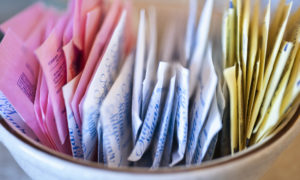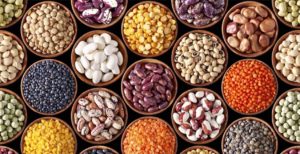Have you ever woken up in the morning with a completely flat stomach and then all of the sudden mid-day it feels like you have gained 10 pounds? Usually, this is not the case and you’re just bloating. Bloating can be seriously uncomfortable and can even make you feel like you’ve put on a few extra pounds. I hate having a bloated stomach, it makes me feel like I am a pregnant lady. Being someone that constantly takes fitness pictures of herself having a bloated stomach can really suck. Thankfully there a lot of ways that you can avoid and reduce bloating and there are definitely some dangerous foods out there that are major contributors to a bloated stomach.
WHY DO YOU HAVE A BLOATED STOMACH?
One of the most common causes of stomach bloating is gas in the abdomen area. Gas is produced by bacteria in our guts that help digest food. Gas can build up in the intestines if your gastrointestinal tract is not moving efficiently or is disturbed, this will cause you to bloat and feel discomfort. Having a bloated stomach is completely different than putting on weight since bloating is temporary.
There a lot of different reasons why you might have a bloated stomach. These reasons might be dehydration, constipation, digestive disorder, Bowel obstruction, hormonal changes and much more, but the main reasons why you might be bloating is because you are consuming a few dangerous foods. Food sensitivities are one of the most commons reasons for extra gas production in your abdomen area.
THE TOP 5 DANGEROUS FOODS THAT CAUSE BLOATING
Your diet plays a huge part of having a healthy digestive system. The bacteria in our guts are very sensitive and there are a lot of different foods that you should look out for.
1. Dairy

Humans are the only mammals that still drink milk as adults. Most people stop producing lactase, the enzyme required to digest Lactose, as we age. Lactose is a sugar composed of galactose and glucose that is found in milk. Lactose makes up around 2–8% of milk, but this can vary. In order for our bodies to digest lactose, our bodies need an adequate amount of lactase. Unfortunately, most of us don’t have the amount of Lactase needed to digest the amount of dairy we are consuming. In return, our gut bacteria are going to produce an excess amount of gas that is going to lead to a bloated stomach.
There is increasing evidence that casein is also associated with milk intolerance. Casein is a protein found in milk. Casein makes up around 80% of milk. Casein activates receptors in your intestinal tract, which can cause the bacteria in your gut to produce excessive gas. This is going to lead to a bloated stomach.
The best way to avoid dairy is to replace it with other plant-based alternatives. There are different types of plant-based milk, yogurts, cheese, ice cream and much more!
More about casein: https://www.ncbi.nlm.nih.gov/pmc/articles/PMC4586534/
2. Sugar Alcohols

Sugar alcohols are types of sweet carbohydrates that are commonly found in sugar-free foods. These are artificial sweeteners with no calories. At first, this might seem like the ideal healthy replacement to refined sugars, but the side effects are just not worth it. These sweeteners are generally considered to be safe alternatives to sugar. However, they may cause digestive problems, because they tend to reach the bacteria in the large intestine. These sugar alcohols are really poorly digested and this stays in your digestive system this causes fermentation to occur in the intestines. This can be a really dangerous food that leads to increase gas production, which leads to a bloated stomach.
Instead of trying to eat sugar-free dessert you can have healthy desserts that are naturally sweetened with fruit. A better alternative to these artificial sweeteners can also be maple syrup, which is a lot better and easier on our digestive system.
A more detailed explanation of the dangers of artificial sweeteners: https://draxe.com/artificial-sweeteners/
3. Beans & Legumes

You have probably heard before that beans and legumes cause a significant amount of “music”. Beans can be a dangerous food when it comes to bloating. There are many different components that make beans & legumes not so great for a flat stomach. Beans make you gassy because they contain saponins. Beans are coated with saponins to protect themselves against insects. This is the foamy stuff you see on top of your pot when you’re cooking your beans. Saponins prevent protein digestion which leads to excess gas and a bloated stomach.
Phytic acid is also the main contributor to a bloated stomach. Phytic acid is a compound found in unprocessed legumes. It reduces the absorption of a lot of nutrients. This interferes with our digestive and causes bloating.Beans and legumes also contain impossible to digest fibers. Humans don’t produce the enzymes to digest these fibers.
Aside from all these side effects, beans and Legumes can actually be really beneficial. Beans and legumes are a great source of protein. They also contain detoxifying fiber. This fiber helps with macronutrient transport through our digestive system. The best way to prevent all these side effects is to wash your beans really well and soak them overnight.
4. Coffee

If you are having coffee every single morning this might be the reason why you are feeling really bloated mid-day. Caffeine can overexcite your digestive tract and even lead to spasms in the bowel. This causes a bloated stomach. Coffee also increases your stomach acidity. This acidity stimulates your stomach cells. This stimulation leads to the production of hydrochloric acid, which at first, promotes digestion but creates problems when its levels go down later on. Coffee stimulates your stomach cells. This stimulation leads to the production of hydrochloric acid. This can help with digesting at first but can cause problems and a bloated stomach later on.
Coffee can be a really dangerous food if you don’t drink it in moderation. Because of the increased levels of acidity, this can make you vulnerable to bacterial infections and you have an increased risk of developing ulcers.
Reduce your coffee intake to only twice a week or at least try not to drink it every single day. Drinking coffee every single day will definitely not help with a flat stomach.
5. Alcohol

Alcohol can be really damaging to our bodies, but can also cause a significant amount of stomach bloating. Most alcohols contain a really huge amount of carbohydrate calories. Just like over-eating, drinking can make you feel full. This excessive amount of carbohydrate is going to make your stomach extremely bloated. You may also feel uncomfortableness in your abdomen area. Alcohol is a diuretic which causes your body to flush water. This will make your body very dehydrated. When your body is dehydrated it will hold on to excess water to combat the dehydration. This will cause puffiness and bloat all over your body.Alcohol can cause damage to the lining of the stomach. An excessive amount of alcohol in our bodies breaks down the natural protective lining of our stomach. This will lead to inflammation of the lining. This will make your stomach bloat and can cause other health problems such as ulcers. Alcohol can be really hard to eliminate for some people, especially in social situations. My tip would be to try limiting your alcohol intake to only a few times a week.
It is really important to know that just because a healthy food causes bloating doesn’t mean you have to completely avoid it. It is important to know how to eat these foods and how much of these foods you should actually eat. Bloating can be a very natural thing that sometimes we can’t really avoid. You can only help and reduce your risk of being bloated.
For more tips on how to reduce bloating check out this video:






















